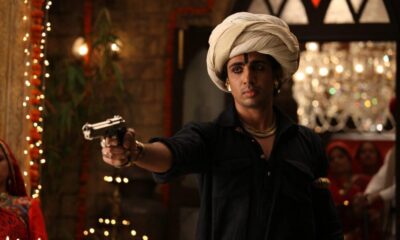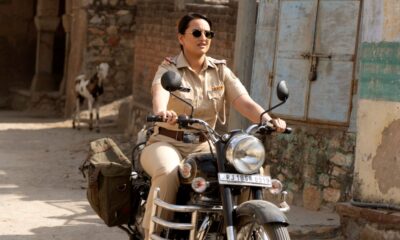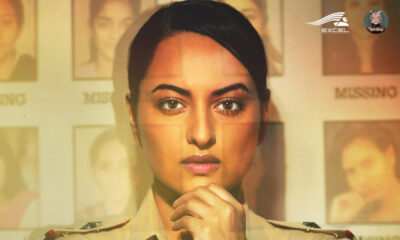Exclusives
Screenwriter Sumit Arora on his career: ‘It has been a journey of doing interesting things’
Sumit Arora is known for writing dialogues of Stree, The Family Man, Dahaad and has co-written Kabir Khan’s next Chandu Champion.
Published
10 months agoon

Screenwriter Sumit Arora has penned the dialogues for some of Hindi cinema’s recent successful films and show which includes Stree, The Family Man, and 83. His latest OTT release Dahaad has brought him a lot of acclaim and the writer has some exciting projects lined up including Kabir Khan’s next Chandu Champion starring Kartik Aaryan and Shah Rukh Khan starrer Jawan. In an exclusive interview with Cine Blitz, Sumit Arora talks about the exciting phase in his career, dialogue writing as a specialized craft, the rights of writers, and why he left writing for television.
You are in an exciting phase in your career with a lot of work happening. How does it feel?
Sumit Arora: It feels great as I get to work with a bunch of different people. Be it Zoya Akhtar & Reema Kagti, Raj & DK, Kabir Khan or Atlee, they all are masters of their game. I am getting to learn and let out a part of my writing talent with each of their genres which is very interesting.
Usually, writers follow one kind of pattern in their writing which I have found to be boring. I have always found it interesting that the next thing I am doing is completely different from the previous one. So, I am really enjoying that part. The people that I am working with are completely different from each other, yet I am being able to work with them flawlessly. That for me is the biggest high.
Even when I work on my own stories, I try to work on different genres. Immediately after Stree, I was offered to write a lot of horror comedies or comedies. I was asked to come and write jokes. Like, “We have a good script ready, just add some humor to it”.
I am not a stand-up comedian. I am a writer. I need to feel a story. If the story excites me then only, I can write something good. If the story doesn’t excite me, I will not be able to write anything, however good the people are or the whole project is.
Also read: Rafuchakkar actress Chahat Vig: “There was great talent on sets with Maniesh Paul and director Ritam Srivastava leading the way”
When you come on board as a dialogue writer, how do you make someone else’s vision your own?
Sumit Arora: Dialogue writing is very unique in India. Not only Bollywood, but all the film industries in India have had legendary dialogue writers. In India, dialogue writing is altogether a different craft. Since the screenplay writers in India come from different places and they write in a certain meter. Then the dialogue writer has to really take it forward and make the character’s language and what they talk about and the philosophies which were established by the screenplay writer. You have to pick those philosophies and characteristics and give them a voice.

Sumit Arora with Stree director Amar Kaushik
If dialogue writing did not have so much value, then the screenplay writers will just do it themselves by just sitting with someone who knows Hindi. But dialogue writing is not just that. You have to get to know the characters, you have to really go deeper and understand where they are coming from. Then some dialogue emerges from that space. This uniqueness can be seen in the work of legendary dialogue writers like Gulzar Sahab and Kadar Khan.
I look at the screenplays given to me, I have conversations with the director and screenplay writers. I understand their vision and the tone of the film. Then I say, “Just leave it to me. I will come back to you.” I do my own version where I go deeper and try to see what can I bring. Sometimes there are some changes in the screenplay. Then you have conversations with the directors or writers. It becomes a collaborative process from thereon.
Also read: Geetika Vidya Ohlyan on her character in School of Lies: “Playing Trisha took away difficult experiences from the past”
What have been the revelations for you from your transition from TV to film to OTT?
Sumit Arora: While working in Television, I was never a guy who could work on infinite stories. I always enjoyed writing finite. I have grown up reading novels. TV was never something that I grew up watching. But obviously, when you come to Mumbai you have to survive, and you have to do what can pay your bills. So, for me initially, it was that.
Then I tried to find shows that I thought could connect with me. For example, Dil Mil Gaye and Chhoona Hai Aasman. Those were very young shows, talking about things that were relatable. But even in them what I found not enjoyable was the infinite nature of storytelling. That it keeps going on.
My thing was that I want to do something nice, have a good feeling about it, and then move on to do something completely new. That was the reason why I left television. I was very eager to work on films. When I started trying for films, I realized that I need to work on my craft, and I did that and slowly it started to work for me. For me, there has been no revelation as such, it has just been a journey of doing interesting things.
Also read: Gippy Grewal gets candid about Carry On Jatta 3 and his equation with Aamir Khan
Do you follow a fixed routine on a daily basis when it comes to writing?
Sumit Arora: I start my day with a workout or a run. I do two sessions of writing. The first is after breakfast before lunch and the second session is after lunch which then goes on till 7 pm to 8 pm or till whenever my brain is working. This is my usual routine. But obviously, it goes for a toss a lot of times because you have meetings. Sometimes you get ideas in the middle of the night. Then you leave everything and write it. So, it depends on each day.

But one thing is there that I write every day. I don’t have that writer’s block concept. I believe in doing it like a job. Get up and sit down to work. That’s what television gave me. In television, you have to deliver every day because it is a daily show. You do not have the luxury to say that you have writer’s block today.
So, that gave me discipline that I have to write, and I have to write quite a lot. That’s why my writing speed is very good and I write every day. It’s basically discipline.
Also read: Tariq Khan-Rockstar of ‘70s turns ‘sentimental’ watching his ‘Tum Kya Jaano’ picturised on Vicky Kaushal in Zara Hatke Zara Bachke
Screenwriters have been struggling to get the respect and payment which they rightfully deserve. How long did it take you to be in a position where you can demand what you think was your worth for a project?
Sumit Arora: See, the thing is that your work keeps changing. You always have to demand it, at every stage. Unfortunately, in the industry, you can only demand a decent amount or your worth, when you have delivered a successful film/show or good quality of work even if it’s not a success. Even if the film has not been successful, based on the quality of your writing, people will say that you are a good writer.
Then you have a legit weapon to use when you are at the negotiating table. That is the truth. It takes that one project which becomes a showcase of your talent to make you sit on the negotiating table with a certain power in your hand. That is how it works.
But there should be some basic dignity and worth assigned to a writer. That is why our association is fighting for a model contract. They are in a very advanced stage of talking to the producers. Once that is established, basic things, basic money, and basic credit will be established in that contract. Because I think right now, we as writers are really fighting for that. Even a young writer should not be subjected to unfair practices, unfair prices, or unfair credit.
Also read: Sanghmitra Hitaishi: “I will play characters that I think I should be playing”
You directed Little Things on Netflix. Was direction a natural progression or do you want to focus more on writing?
Sumit Arora: I always wanted to be a writer-director. I really enjoy writing and I am born to be a writer. But I always wanted to direct certain stories which are close to my heart. So even before Stree, I directed a short film in 2017 called White Shirt. So, I was on my way to work on my directorial feature pitching it around and then Amar Kaushik who was a friend approached me to write dialogues for Stree which was a small film. It was a very enjoyable film so I loved writing. There I met Raj & DK, then The Family Man happened. Then Stree and The Family Man blew up in 3 months.

Stree was released in August 2018. The dialogues were liked so much that it got me a lot more work from the makers whom I really admired. Kabir Khan approached me to work on dialogue for 83. So, my directorial plans got sidelined as I was getting work from people whom I always admired as makers.
So, I thought, ‘let me do this for a while and then, I can work on my directorial’. I obviously directed Little Things because I had signed it pre-Stree. Then I got a lot of offers to direct but I enjoyed writing for all these makers. Now I am again on the path of directing my own feature film.
Also read: Somy Ali shares how N.N. Sippy made the best use of monsoon in Teesra Kaun starring her alongside Mithun Chakraborty and Chunky Panday
You have written films/shows with sometimes 3-4 writers. How does collaborative writing work?
Sumit Arora: In all these projects, I have never written dialogues with somebody else. I make it very clear that dialogues will be completely mine. So, there hasn’t been anyone else on the table that I am writing on. But in the overall team, screenplay writers are there. But in the film that I have written with Kabir Khan, I have written the story, screenplay, and dialogue with him.
Collaborative writing is a very exciting and interesting process. You get to work with different minds. You get to interact with different people. You can keep each other on your toes by throwing ideas off each other when you meet and sit across the table and just bounce ideas off each other. Then one person writes certain things and the other person writes certain things and then shares ideas. Then you do a pass on each other’s work. It’s a very interesting process where two brains are meeting to create something that probably we could not have created on their own.
You may like


“I dedicate this award to Reema Kagti, my director,” says Vijay Varma on winning Best Actor in Series for Dahaad at IFFM


7 times Gulshan Devaiah proved his versatility as an actor


5 reasons why Dahaad should be on your binge-list


Sonakshi Sinha on her journey from Dabangg to Dahaad: “It took me 13 years to go from Cop-Wife to a Fierce Cop”


Sonakshi Sinha, Vijay Varma, Gulshan Devaiah-starrer Dahaad to premiere of Amazon Prime Video on May 12


Sanghmitra Hitaishi: “I will play characters that I think I should be playing”












